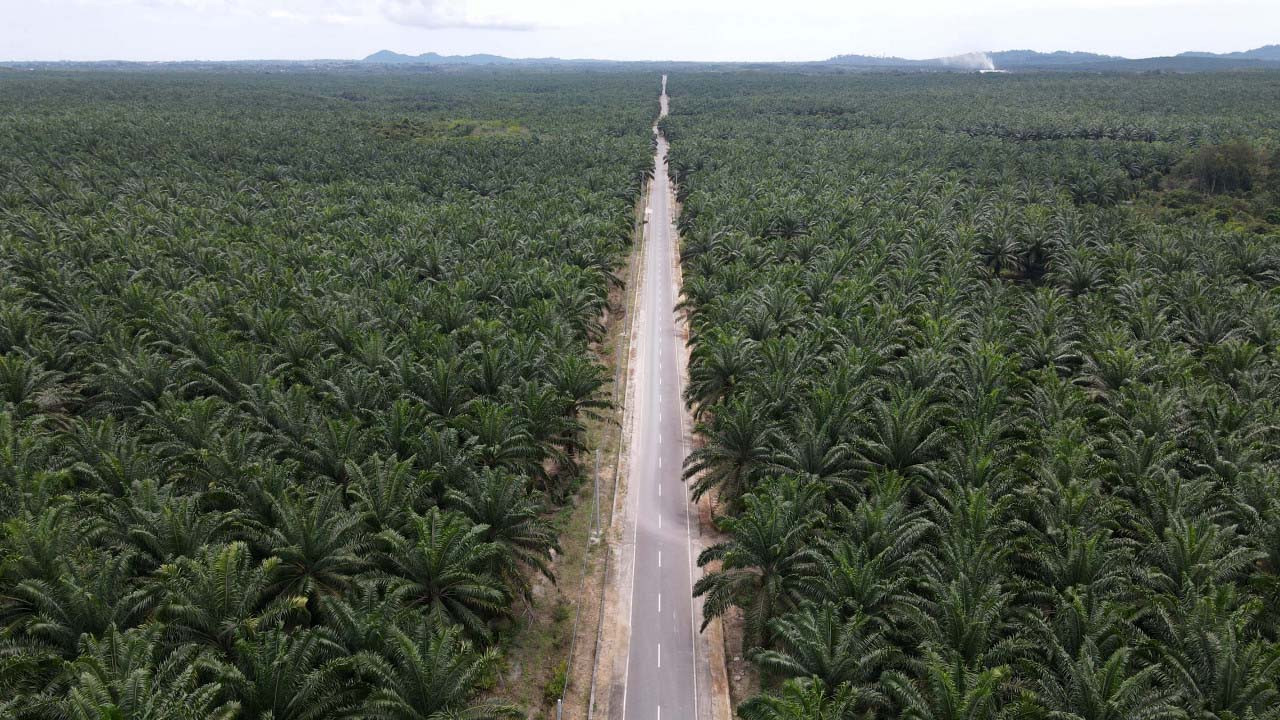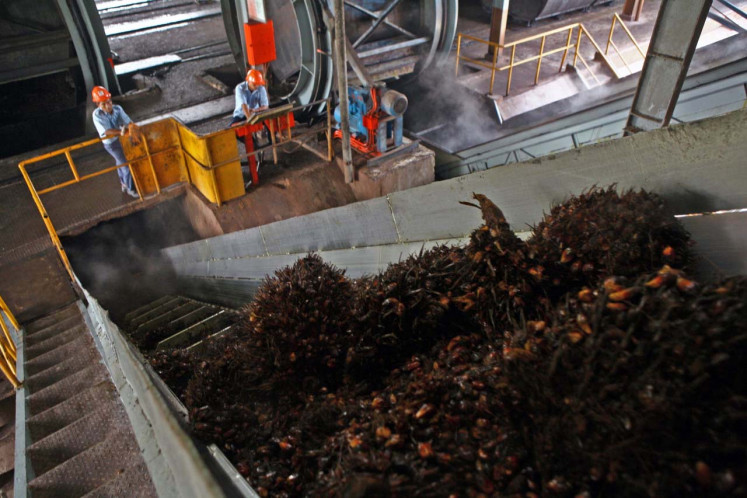Popular Reads
Top Results
Can't find what you're looking for?
View all search resultsPopular Reads
Top Results
Can't find what you're looking for?
View all search resultsShared responsibility key to sustainable palm oil industry in Indonesia
Change text size
Gift Premium Articles
to Anyone
S
hared responsibility and close cooperation among various stakeholders are the keys to ensuring a sustainable palm oil industry in Indonesia, a recent webinar has concluded.
The webinar, themed Shared Responsibility Boosts Sustainable Palm Oil Absorption in Indonesia, was held on Aug. 19 by the international NGO Roundtable on Sustainable Palm Oil (RSPO).
Hosted by the RSPO and CNN Indonesia, the webinar featured speakers from the RSPO, fast-moving consumer goods producer Unilever, Singapore-listed Golden Agri Resources (GAR), environmental NGO World Wide Fund for Nature Indonesia (WWF Indonesia) and the Indonesian Consumers Foundation (YLKI).
The speakers illustrated the role each stakeholder could play in ensuring sustainable palm oil production.
Established in 2004, the RSPO is headquartered in Zurich, Switzerland. It seeks to promote the growth and consumption of sustainable palm oil products in line with credible global standards through multistakeholder collaboration involving the palm oil industry, investors, consumer goods producers, retailers and social and developmental NGOs.
The RSPO has consistently promoted the concept of shared responsibility after adopting the principle at its 15th general assembly in 2018. The shared responsibility concept aims to encourage the various stakeholders in the RSPO to play a role in achieving its vision to transform the market to make sustainable palm oil the norm.
The webinar explored various ways in which each stakeholder could help balance the scales of sustainable palm oil production and sustainable palm oil consumption. To achieve this, downstream businesses like retailers, consumer goods manufacturers, processors and traders are expected to play major roles.
Furthermore, other RSPO members, representing environmental and social NGOs, as well as banks and investors, could help create an ecosystem to support downstream businesses to make this happen. Therefore, it is important stakeholders across various fields actively affirm each other’s important work, while committing themselves fully to the cause.
Meanwhile, it is also essential for all RSPO stakeholders to unanimously agree on accountability measures in progressing toward their goals, including not only palm oil producers but also obviously, its buyers.
According to RSPO Indonesia country director Tiur Rumondang, throughout the RSPO’s 14 years of operations, there had been perception among some stakeholders that buyers had not placed a priority on palm oil production standards in the way producers had, as buyers were not bound by any regulations to do so.
GAR sustainability and strategic stakeholder engagement managing director Agus Purnomo also shared this sentiment. He said he felt as if the burden of responsibility to achieve sustainable palm oil production rested solely on shoulders of producers.
On the matter of the even sharing of responsibilities, WWF Indonesia head of market transformation Aditya Bayunanda said close collaboration between buyers and producers was essential, as many end consumers relied heavily on palm oil products such as cooking oils, medicines and personal hygiene products.
“Joint efforts are needed to ensure consumers and the value chain up to the producers and farmers gain benefits and there is transparency so that consumers can use their purchasing power to incentivize producers, including smallholders,” Aditya said.
WWF Indonesia has done its share to support this by promoting certified and responsibly sourced palm oil products in both domestic and foreign markets, while sharing information on where market players can purchase responsibly sourced palm oil.
Responsible production: Workers load palm fruit bunches to be processed into crude palm oil and kernel for export at PT Indo Sawit Subur Riau’s factory. The responsible production of palm oil requires shared responsibility among stakeholders, including palm oil producers. (JP/Ricky Yudhistira)Aditya went on to say that the WWF also worked with the palm oil farmers in Riau and West Kalimantan, particularly around the latter’s Sintang regency, to make sure farmers benefited from the demand for environmentally friendly palm oil produce.
“Such demand also corresponds with the need for traceability,” said Aditya.
Meanwhile, according to Agus, as a producer, GAR had incorporated aspects related to the rights of workers and communities into its corporate policy.
The company has around 270,000 hectares of plantations, for which it has obtained RSPO certification, that is capable of producing up to 1.3 million tons of crude palm oil (CPO).
“We would also like to encourage factories and farmers who are yet to join the RSPO to also launch similar policies on sustainability. Our database includes around 80 percent of our suppliers. This data availability is important to assure our consumers that they are buying products from plantations and factories committed to sustainability,” Agus said.
Speaking of consumers, YLKI chairman Tulus Abadi said the majority of consumers in Indonesia were not well-informed about the diversity of palm oil-based products.
“Most Indonesian consumers only think of cooking oil when they think about palm oil, while considering only price and quality in purchasing these products. Furthermore, most consumers are still unconcerned about sustainable consumption of palm oil. This happens because industry players do not properly educate consumers on product knowledge and are yet to formulate clear policies on this matter,” according to Tulus.
YLKI encourages the cooking oil industry to ensure its products are produced in an environmentally friendly manner, from the upstream sector to the downstream. The cooking oil industry must also guarantee no violations of labor or farmers’ rights occur during the production process, and that taxation laws are complied with, Tulus said.











